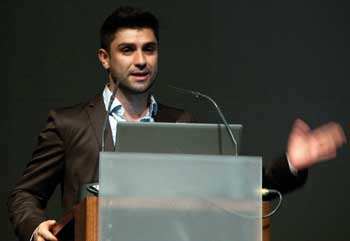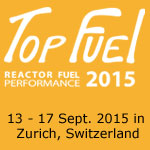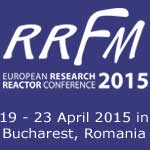
| |
 |
MA: Sometimes at the YGN we feel frustrated because the norms and values of the industry in general collide with those of the young generation. This is due to the generation gap which exists in our sector. The businesses have tried to overcome that gap and to close it, but I think we have not been successful. It comes down to the nature of the nuclear sector – it is conservative and highly criticised, which leads to businesses trying to shield |
themselves from the outside world. This has made us somewhat less creative. We do not tend to think outside the box and sometimes I feel like we are stuck in an age that is not aligned with today’s values.
NucNet: What is the solution to these problems?
MA: In the past two or three years, there has been increased interest from businesses and working groups in knowing what it takes to recruit people to the sector from our, younger, age-group, and also to keep them. When the young generation gets invited to speak at working groups, I always say we should think about the situation from a wider perspective. The decision-makers in our business belong to the generation of our parents. They tell us that we should sit down in the office and gain 20-30 years of experience and only then will they listen to what we have to say. I am exaggerating, but it illustrates my point. This creates a friction between my generation’s values and those of the decision-making generation.
NucNet: What do you think about education and training initiatives by international organisations aimed at bridging the gap between the generations?
MA: I think these programmes are great. The problem is that, for example, the International Atomic Energy Agency is an organisation and academia is an interface point, but these two are usually not aligned with the industry. The industry is everyday life; it is where you go to work. The IAEA, academia and policy-making are another level and this level is not aligned to the needs of the industry. Such organisations can have programmes and initiatives, but they should align themselves.
NucNet: Do you think the young generation is often forgotten or overlooked?
MA: Yes. This goes hand-in-hand with the industry’s situation. If you rewind to 40 or 50 years, the nuclear industry was sexy, new and hip. It was also protected by governments. The people who were trained and hired at the time did not have to think about market share, competition or surviving in a market environment. All public relations, human resources and public opinion were dealt with by the government. The only thing these people had to concentrate on was doing their work.
Suddenly, after the Chernobyl accident, most of Europe and the West deregulated their energy markets. Most states sold their shares in the nuclear energy business and all these people who had been protected had to act in order to survive. The young generation is often forgotten because of this situation. A company acting in today’s world has quarterly economic and financial reports which create short-term thinking. Without long-term thinking, for the next 40 or 60 years, the young generation becomes overlooked.
If you look at other sectors, like the motor industry, businesses have competed for many years and have adapted to the market. The nuclear sector is still adapting to these new conditions, but we will get there in the end. In the meantime, we are taking heavy blows because it is a tough transition. The nuclear sector is competing with fossil fuel companies which have had to compete in the market for a long time. This process takes time.
NucNet: What are the prospects for a young person studying nuclear engineering at the moment?
MA: The prospects are great. There are many job opportunities. The problem is not hiring people, but keeping them. We usually lose people after three to five years. This happens because young people lose interest. They cannot see the next steps in their career because there is no clear career path. Also, some people become frustrated with the friction I mentioned earlier – the conservative mentality and not being open to the public. I would be proud my company sponsored, for example, a football team. But this does not happen because companies in the nuclear sector do not tend to speak out beyond what they do. This makes them look like they are not proud of what they do.
NucNet: As young generation president, what is the main challenge you have to deal with?
MA: A few years ago the young generation had an identity crisis. We needed to define exactly what we are. Are we lobbyists, or are we promoters? We were not sure what kind of message we wanted to send out. At the time, I thought to myself that we represent a group and we should speak up about what this group wants. So, we listed topics which are important to us like increasing the number of women in the nuclear industry or increasing the number of young people in important decision-making positions. Now we are going to take another step and challenge industry to be more transparent.
There was a Nuclear Industry Summit in March in Amsterdam and when they took the picture of participants I could count only four or five women. The industry was proud of that picture, while I would not be proud of it. Nevertheless, I understand that engineering in general in the world of 50 years ago was not appealing to women. Today there are many who consider a career in the sector. We should take these women in.
NucNet: How is the European Nuclear Society supporting your efforts?
MA: The European YGN, as part of ENS, receives funds for its operations from ENS. We have also very recently negotiated to have a young person sit on the ENS High Scientific Council and have our own web page separate from that of ENS. We will have a blog on our new web page through which we want to inform the public about nuclear energy in a very simple language. For example, the president of the High Scientific Council supports the idea of having a list of myths about nuclear energy and we will allow the Council to explain them in simple terms. It is not sufficient to say that radiation is dangerous. This needs to be explained so we can build transparency and credibility.
We are also active of Twitter, LinkedIn and Facebook. We are doing a lot which is more appealing to the younger generation. It is very simple – if you can stand for what you do, it is going to be easy to explain it to your neighbour. It is easier to be part of the sector if you believe in what you are doing.
NucNet: What is the theme of the International Youth Nuclear Congress (IYNC) 2014?
MA: Usually, the themes and topics discussed at the IYNC are ones which are important for the Young Generation. They address the future of nuclear. This year, we will talk about operation and maintenance, Generation III reactors, small modular reactors and fusion. We will also talk about education and training, and human resources – as always during our conferences we will discuss the future of the sector. When it comes to the YGN, we always think about the future.
Background
Milo Alani has been chairman of the European Young Generation Network since 2013. He graduated with an MSc in applied mathematics in Sweden and works for Westinghouse Electric Sweden.
The European Young Generation Network was founded in 1994 in Sweden and became part of the European Nuclear Society in 1995. The YGN includes 24 countries.
The International Youth Nuclear Congress will be held in Burgos, Spain, from 6 to 12 July 2014. There will be six technical tours, including visits to the Santa María de Garoña nuclear power plant and control room simulators at Tecnatom, Madrid. For details and registration: www.iync.org.
Follow NucNet on Twitter @nucnetnews
Find us on Facebook: facebook.com/nucnet
To contact the editor responsible for this story: Lubomir Mitev at lubomir.mitev@nucnet.org


